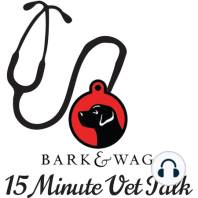1 min listen
What is kennel cough in dogs?
ratings:
Length:
12 minutes
Released:
Apr 27, 2019
Format:
Podcast episode
Description
Kennel cough in dogs Kennel cough is a condition that affects the upper respiratory tract of dogs and is characterized by the inflammation of the trachea and bronchi. While kennel cough may sound like a horrific condition, it’s not actually as terrible as most dog owners assume. However, the effects of the condition can vary depending on each individual dog. For this reason, you may want to avoid your dog catching the illness if possible. To do this, you need to understand where the name comes from. Why is it called kennel cough? This condition is referred to as a kennel cough because, perhaps, unsurprisingly it is most commonly found and caught in kennels or anywhere that there are a lot of dogs in close proximity to one another. Kennels or shelters are the obvious risk zone, but training facilities and dog parks can be another place where dogs are likely to contract this illness. Ultimately kennel cough in dogs is very much like the typical human cold. It’s very common and will spread from dog to dog. Kennel cough causes Kennel cough does not have one individual cause. There are often multiple infectious agents that are working at the same time to infect your dog. Which is why it is also referred to as Canine Infectious Respiratory Disease (CIRD) or Infectious Tracheobronchitis. Viral pathogens include canine distemper (CDV), canine parainfluenza (CPIV), canine adenovirus type 2 (CAV-2), canine influenza (CIV), canine herpesvirus (CHV), canine respiratory coronavirus (CRCoV), pantropic canine coronavirus, canine reovirus, and canine pneumovirus (CnPnV). Bacterial pathogens include Bordetella bronchiseptica, Mycoplasma spp., and Streptococcus equi subsp. zooepidemicus. One of the most common causes is a bacteria known as Bordetella bronchiseptica. Due to this cause kennel cough may also be referred to as Bordetella. However, this bacteria may work with a virus such as canine distemper or canine parainfluenza. Both are problematic for your pet as they weaken the animal’s immune system and affect both the dog’s voice box and windpipe. Dogs can contract a kennel cough in a variety of different ways. The most common way is to catch it from the air as it is spread by another dog. A dog with this infection may sneeze, bark or cough. Any one of these things can flood the air with thousands of organisms.. A dog may also get infected by using an item such as a toy or food dish that another dog with the infection has used. You should also know that bacteria can remain alive on a food bowl for up to forty-eight hours. This is another reason why you should be wary of kennels, particularly if there are signs that dogs at that kennel are infected. The final way this disease can spread is through animal interactions. Whether your dog plays, sniffs or licks another dog, if it has the infection, it will almost certainly pass it on. So, while letting your dog play with another dog may seem fun you do have to be careful. Signs of kennel cough One of the challenges of keeping a dog with a kennel cough away from other dogs is that it’s not always possible to tell that they have it. A dog can carry kennel cough and show no symptoms at all yet still pass on the infectious organisms to other dogs. As such, a dog might seem safe for your pet to interact with and still be carrying kennel cough. Not much you can do in that case. Other dogs will present more symptoms. The most common symptom is a dry, hacking cough. This may be followed by gagging or retching. It will be irritating for your dog and may even hurt her throat. It can sound far worse than it is so try not to panic if your dog does start to show this symptom. In most cases, this cough is completely harmless and will go away within a couple of weeks. Still you should have your dog checked out by your veterinarian as there are other causes of coughing that are more serious. Make sure you call or otherwise notify them you are coming in so they can take precautions to prevent infection of ot
Released:
Apr 27, 2019
Format:
Podcast episode
Titles in the series (100)
Thank you for a great 2016! Here is to a successful 2017!: Bark & Wag would like to thank you for being a subscriber. We have lots of interviews planned in 2017 to keep you informed. We are grateful for your support. by Bark n Wag 15 Minute Vet Talk
